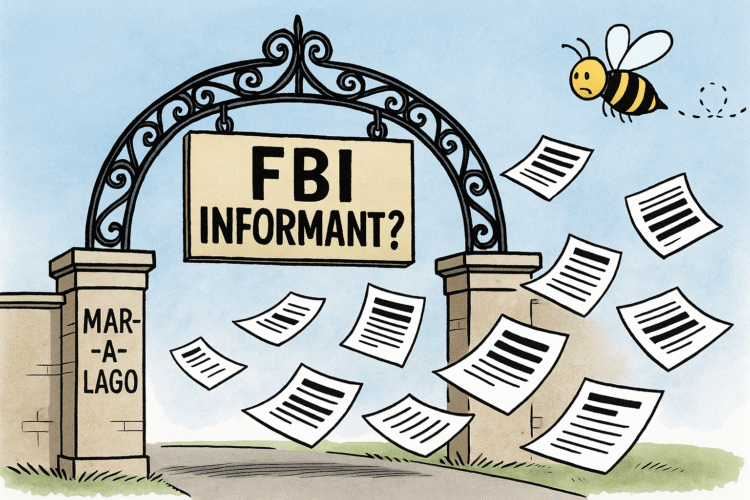
On September 5, 2025, House Speaker Mike Johnson stood before reporters and unleashed a claim so improbable it deserves its own Netflix docudrama: Donald J. Trump, former president, serial golf cheat, and part-time beauty pageant impresario, was an FBI informant against Jeffrey Epstein.
The defense was as brazen as it was bizarre. Johnson, cornered by questions about Trump’s repeated “Epstein hoax” refrains, decided to pivot. Forget the mounting calls for unredacted files. Forget the survivors packing Capitol Hill demanding truth. The real story, Johnson insisted, was that Trump had been secretly helping the feds all along. Move over Deep Throat. Step aside Serpico. History’s newest unsung informant wore a red tie and had a Mar-a-Lago buffet to run.
Hours later, Johnson’s office attempted a clean-up operation, saying he was merely echoing a victims’ attorney who praised Trump for “helping prosecutors” and kicking Epstein out of Mar-a-Lago. But timelines have this annoying way of not cooperating with myth-making.
The Mar-a-Lago Fairy Tale
Trump himself has told this story so many times he’s practically auditioning for a SAG card. According to him, he personally ousted Epstein from Mar-a-Lago for hitting on spa staff, bravely defending the honor of his club masseuses. It’s a neat anecdote, heavy on moral authority, light on verifiable detail.
Reality, of course, is messier. Reporting shows Epstein remained a member of Mar-a-Lago for more than a year after his 2006 indictment. So either Trump has a very generous definition of “kicking out,” or the bouncers at Mar-a-Lago need remedial training.
But here’s the kicker: in this retelling, Trump doesn’t just ban Epstein. He morphs into an FBI informant, a secret crusader against trafficking. Which is like claiming you invented the vaccine because you once sneezed politely.
Informant Math
To call Trump an informant is to break language itself. Informants hand over leads. Informants testify. Informants risk themselves for the integrity of justice. Trump, on the other hand, has risked himself primarily at buffets and in bankruptcy courts.
If Trump were truly an FBI informant against Epstein, one imagines the Bureau might have produced evidence during the actual Epstein investigation. They did not. One imagines survivors would recall his role. They do not. Instead, what we have is Johnson’s improvisation—a desperate flourish to rewrite a relationship that was always more social than secret.
Survivors Demand Receipts
While Johnson spun mythology, Epstein survivors were busy staging reality. They packed Capitol Hill, demanding full, unredacted files. They asked, again, why Congress continues to dribble out 33,000 heavily redacted pages instead of confronting the rot at the core: who enabled Epstein, who protected him, and who else deserves exposure.
For survivors, Trump’s supposed FBI heroics aren’t just irrelevant—they’re insulting. The demand isn’t for folklore. It’s for receipts. The myth-making isn’t just a distraction. It’s a deliberate attempt to cloud the fight for transparency.
Massie, Khanna, and the Push for Sunlight
Into this fog marched an unlikely pair: Rep. Thomas Massie, libertarian Kentuckian, and Rep. Ro Khanna, progressive Californian. Together they filed a discharge petition to force a floor vote compelling full disclosure of Epstein records.
It’s the rare bipartisan alliance that makes sense. Sunlight isn’t left or right. It’s survival. But while Massie and Khanna push for transparency, Johnson spins fiction, Trump screams “hoax,” and the White House dithers about privacy. Survivors, once again, are left holding the weight of power’s evasions.
Myth vs. Transparency
What we’re left with is a choice between myth-making and transparency. On one side: Johnson recasting Trump as an undercover informant, the Mar-a-Lago mole. On the other: survivors demanding documents, unredacted and unspun.
The irony is brutal. Congress is perfectly capable of mythologizing Epstein, perfectly capable of weaponizing him, perfectly capable of staging outrage. But when it comes to actual disclosure—actual accountability—Congress transforms into a snail in molasses.
The Satirical Core
The satire here isn’t subtle:
- A House Speaker tries to recast Donald Trump, a man allergic to detail and discipline, as an FBI informant.
- Survivors demand unredacted truth, and instead get redacted paper and improvisational press conferences.
- A bipartisan discharge petition languishes while leadership performs outrage management.
- A man who hosted Epstein at Mar-a-Lago longer than he admits is now painted as the Bureau’s secret weapon.
It’s less governance than improv theater. Less truth than fan fiction.
The Haunting Observation
On September 5, 2025, the myth grew louder than the demand for truth. Survivors filled Capitol Hill asking for receipts, while Speaker Mike Johnson auditioned Trump for the role of FBI informant. The result wasn’t clarity. It was noise.
The haunting truth is this: the more power escapes into myth, the less justice survives in light. Survivors are left begging for facts while leaders tell bedtime stories. Transparency remains trapped in redactions. And America, once again, is asked to choose between the messy truth of complicity and the comforting fiction of Trump-as-hero.
And in that choice, as always, the powerful find cover, the survivors are told to wait, and justice becomes another casualty of the spin.